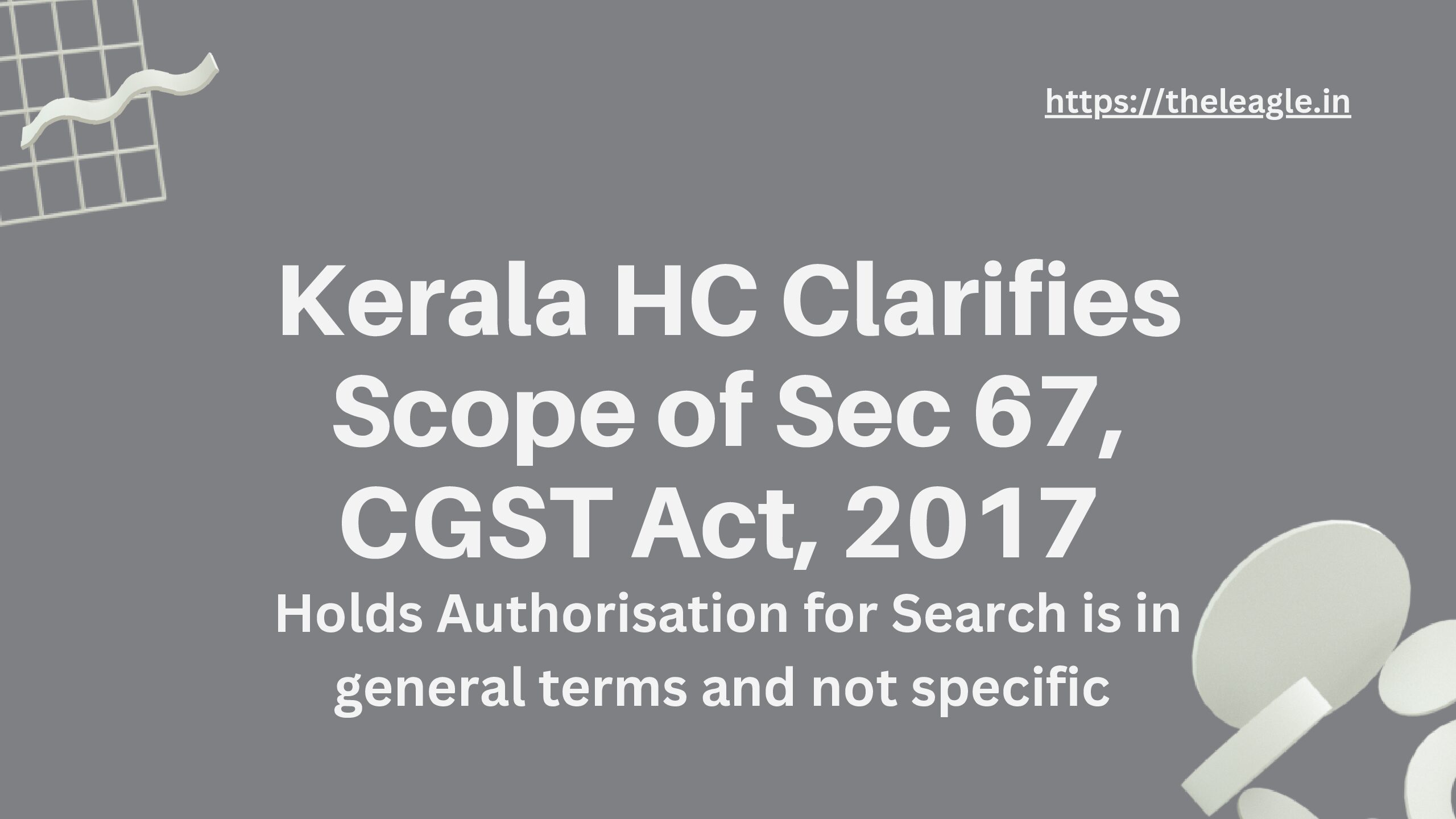In a recent judgment[1], the Kerala High Court clarified that the authorization provided by a Joint Commissioner for inspection, search and seizure could not be in specific terms, but is only granted in general terms. If the criteria of Section 67, Central Goods and Services Act, 2017 and/or relevant State GST legislation were fulfilled, the authorization cannot be assailed to be illegal.
Facts
Petitioner filed a writ petition assailing the order of seizure as well as the order of confiscation passed by the Joint Commissioner. The search took place in the business premises of M/s Sobhana Jewellery after authorization given by the Joint Commissioner under section 67(2) of the Kerala Goods and Services Tax Act/Central Goods and Services Tax Act (KGST/CGST). During the search of premises, certain gold ornaments were found in a bag belonging to the petitioner which were accompanied by a delivery challan. The delivery challan was for transportation of the gold ornaments from the petitioner to M/s Sobhana Jewellery. The gold ornaments were verified by the officers and some discrepancies were found in the documents because of which the gold ornaments in the bag were seized.
The petitioner’s objection to seizure of the gold ornaments was that it was the owner of the gold ornaments in question and that the persons who were present in the business premises of M/s Sobhana Jewellery were one of the partners of its firm and one of its employees. And that the authorization granted by the Joint Commissioner under Section 67(2) for search, seizure and inspection was not for seizing its gold ornaments and thus the seizure was null and void. The petitioner’s case, in effect, was that the authorization for search and seizure was regard to business premises of M/s Sobhana Jewellery and not the articles that belonged to them.
Kerala HC Interprets Section 67
Relevant portion of Section 67(2), CGST Act, 2017 that was the subject of interpretation is as follows:
Where the proper officer, not below the rank of Joint Commissioner, either pursuant to an inspection carried out under sub-section (1) or otherwise, has reasons to believe that any goods liable to confiscation or any documents or books or things, which in his opinion shall be useful for or relevant to any proceedings under this Act, are secreted in any place, he may authorise in writing any other officer or central tax to search and seize or may himself search and seize such goods, documents or books or things: (emphasis added)
There are two important ingredients that a Joint Commissioner needs to satisfy before granting authorization for search and seizure under Section 67(2): first, the Joint Commissioner must have a reason to believe; second, the authorization must be regard to goods or documents or books or things which will be useful or relevant to any proceedings under the Act. It is latter that is the subject of concern in the impugned judgment. It is evident that the Joint Commissioner cannot anticipate in granular detail the nature and kinds of goods, documents, etc. that the officers will encounter during their search and inspection. Thus, the authorization granted by a Joint Commissioner cannot specify which ones can be seized and which ones cannot. Recognizing the above elements, the Kerala High Court rejected the petitioner’s argument and observed that:
Authorisation has to be in general terms and cannot be with respect to any specific books, items, things or documents. What is relevant is that while granting authorisation for search and seizure operations, the authority granting such permission, i.e., Joint Commissioner or Officer above the rank of Joint Commissioner, should have reasons to believe that the goods, documents or things hold relevance and are useful in any legal proceedings under the SGST/CGST Act 2017 and the same are secreted at a particular place. (para 5)
The Kerala High Court added that the authorization cannot be in respect of each and every article, good, etc. The authorization is in respect of the business premises of the assessee. (para 5.2) In stating so, the High Court clarified that if goods, articles, etc. belonging to a person other than an assessee are found in the premises of the assessee and the officers find them to relevant or useful to any proceedings under the KGST/CGST, they can be confiscated. It is not necessary that the title to such seized items should belong to the assessee, the confiscated goods can belong to a third party if they are found in the business premises of the assessee.
Conclusion The Kerala High Court’s decision is a correct interpretation of the scope of permission granted to officers under Section 67. If the officers were empowered to only seize articles belonging to the assessee whose premises were being inspected, it would reduce the efficacy of the entire exercise. The barrier of them finding the articles ‘relevant and useful’ though remains; but, the scope of this barrier is the subject of another discussion.
[1] Velayudhan Gold LLP v Intelligence Officer, Intelligence Unit, Kottarakkara TS-561-HCKER-2023-GST.
